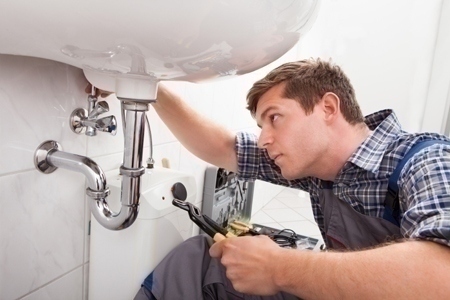 (MCT)—Plumbing has always been one of the most frequently searched categories on Angie’s List. Naturally, if the sink is stopped up or the commode’s kaput, you want it fixed, and fast.
(MCT)—Plumbing has always been one of the most frequently searched categories on Angie’s List. Naturally, if the sink is stopped up or the commode’s kaput, you want it fixed, and fast.
That’s why I advise homeowners to establish—before an emergency—a connection with a highly rated local plumber. I also urge you to find your home’s main water shutoff valve (it’s usually near the water meter, by the way). Quickly turning off water to your home could forestall extensive water damage from a leak or overflow that isn’t stopped by shutting off an individual toilet or appliance’s water supply.
The immediate need to restore plumbing service can leave an unprepared consumer susceptible to scams. Here are some red flags to watch out for:
Unusually low bids. If a contractor doesn’t provide the full cost, he or she may later ask for more money to complete the job.
No contract. Without a written estimate and detailed contract, a contractor could try to inflate the price. Don’t sign a contract unless it specifies all pertinent details, including how much will be paid and when. Be aware that some states limit the amount of money a contractor can accept upfront; 10 percent is the limit in California, for example.
Scare tactics and high pressure. Beware of contractors who try to rush you into costly action to avoid a crisis, such as a sewer overflow. In most cases, you can avoid or reduce damage by shutting off water to the home. In general, when faced with a high-pressure pitch, take time to get another opinion.
Using low-quality materials while charging for better. Make sure the materials you pay for are what you expected. For example, cross-linked polyethylene (PEX) piping and copper tubing costs more than other types because they’re considered higher quality. A contractor might promise to use top-flight parts and may charge for them, but actually install lower-quality items. If you have any reason for doubt, ask for a parts list and check prices of similar items online or at a store. Or, compare the brand and type of materials on the invoice with what’s actually used.
Planting evidence. We’ve heard stories of workers operating in pairs, with one talking to the customer while the other creates “evidence” of a broken sewer pipe. In a related practice, some show you video “proof” of a problem, but the images they provide show an entirely different system. To avoid this, ask a technician to videotape something identifiable near your sewer clean out. Hire only contractors with proven records of consumer satisfaction.
Always follow the tried-and-true advice of hiring only contractors who are appropriately licensed, insured and bonded and who have positive consumer reviews on a trusted online site.
Angie Hicks is the founder of Angie’s List, a resource for local consumer reviews on everything from home repair to health care. Follow her on Twitter @Angie_Hicks.)
Distributed by MCT Information Services










